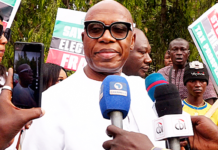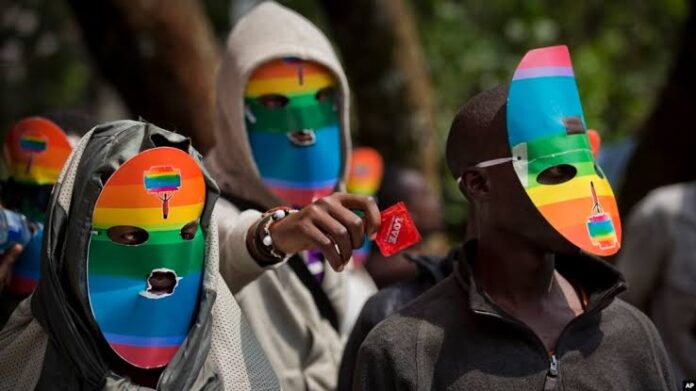The congregation in Nairobi, Kenya, has been forced to move to 10 different locations over 10 years, and yet it has survived as a sanctuary in an increasingly hostile environment.
For nearly a decade, Kenya’s only church led and attended by L.G.B.T.Q. people has been chased out of one location after another. Vandals hit the first location, a center for sex workers, church members said. When they moved to Nairobi’s Central Park, the police arrested them. A city building barred them from entry, and at another site, neighbors attacked them with stones.
After 10 locations over 10 years as a fugitive church, they have finally found a sanctuary. But the site is a secret.
On a recent Sunday afternoon, down an empty street, in a room filled with nearly 100 worshipers who had been checked by a team of church members at the entrance, tears flowed freely as a pastor delivered his sermon: “Family may kick you out, and the church you once attended could not understand that kind of expression, demonizing your life,” preached the pastor, as murmurs of recognition rippled through the congregation.
“But today,” the pastor’s voice rose with conviction, “I found a place for you in the Bible. Praise the Lord!”
“Amen,” the congregation cheered in unison.
Many in the room fled neighboring countries where being L.G.B.T.Q. is so dangerous it can be fatal. This weekly service is their chance to worship openly, embracing both their faith and their gender and sexual identities.

A wave of anti-gay sentiment has recently surged across parts of Africa. Uganda led the charge with a revised anti-gay law, passed in March 2023, and politicians have openly called for gay people to be killed. Rwanda has seen attacks, while Tanzania’s authorities have conducted arrests.
Kenya is considered more tolerant than its neighbors. While same-sex relations are technically illegal, they are rarely prosecuted, and advocacy organizations maintain a strong presence. But activists say that even Kenya has grown more hostile since 2022, when President William Ruto, an evangelical Christian, took office.
After Kenya’s Supreme Court allowed a gay rights group to register legally in 2023, Mr. Ruto declared: “We respect the Supreme Court verdict, but homosexuality is unacceptable.” He added that it “goes against the country’s cultures and religious beliefs.”
Despite years of persecution, the L.G.B.T.Q. congregation in Nairobi has survived and grown, sustained mostly by private donations. Attendance ranges from 50 to as many as 200 worshipers. Leaders of religious and advocacy organizations said it is the only church in Kenya created by and for L.G.B.T.Q. people and supporters.
NEW YORK TIMES





